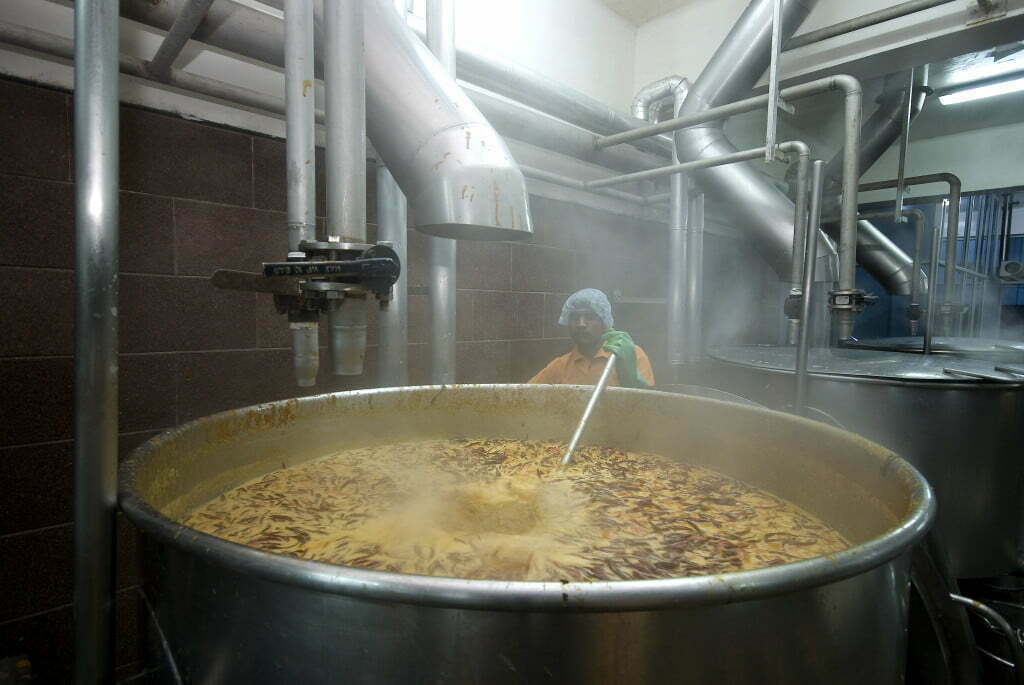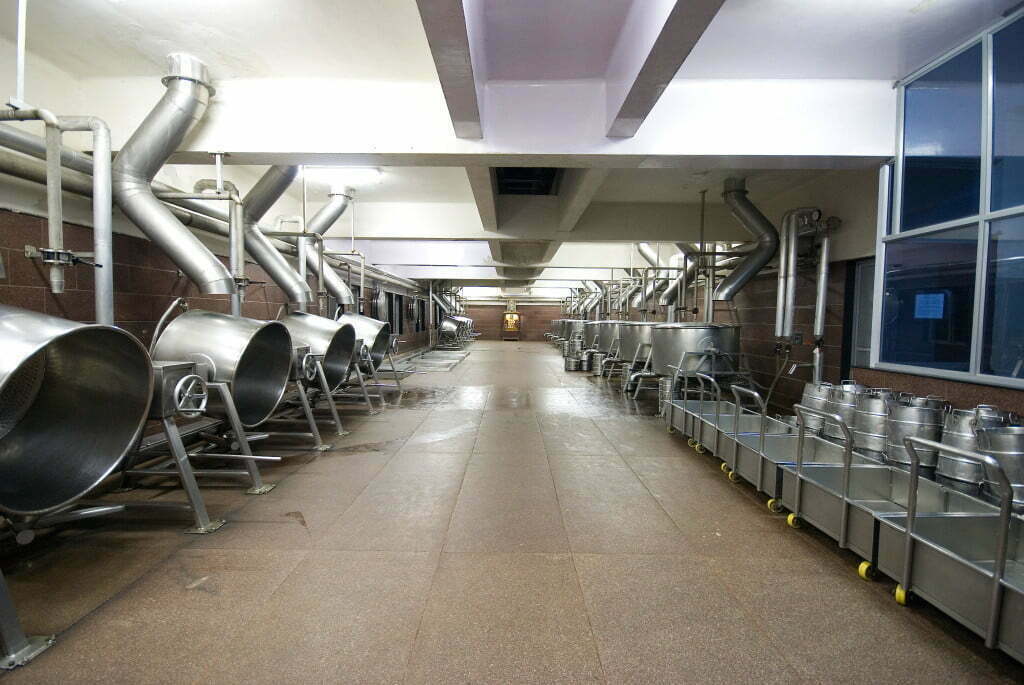
The Akshaya Patra Foundation made its modest beginning in the year 2000 by serving meals to 1500 children of 5 schools in Bangalore. The impact of this move was seen in no time; school teachers reported an increase in the attendance and more importantly children were beginning to focus on the lessons. The word spread around rapidly and requests started pouring in from neighboring schools. With this, the need to scale up became imperative.
It was then that Madhu Pandit Dasa, Chairman of The Akshaya Patra Foundation, and T V Mohandas Pai, Chairman, Manipal Global Education Services, along with a group of committed leaders understood the intensity of the problem and decided to address it on a larger scale. Leveraging on local technology and innovation, and backed with their engineering and management expertise, they built the first mechanized kitchen in the year 2000 and started feeding 10, 000 children in Bangalore. However, it’s much needed impetus came in 2001 when the Supreme Court of India in a landmark direction, launched the Mid-Day Meal Scheme (MDMS) under which all primary and upper primary children of India’s government schools shall be entitled to a cooked meal. The Akshaya Patra Foundation then became the first NGO-implementing partner of the Government’s MDM scheme thereby getting the right platform to reach out to a larger number and today, 14 years later, the Foundation feeds 1.4 million children across 10 states and 23 locations with a hot and more importantly an unlimited meal, on every school-working day.
Akshaya Patra’s mid-day meal programme reaches out to both; urban and rural India through its dual-pronged strategy of centralized and decentralized kitchens. It’s 21 centralized kitchens, often called ‘the happiness factory’ cater to the urban children whereas in rural inaccessible areas such as the deserts of Baran, Rajasthan and the deep jungles of Nayagarh, Orissa, decentralized school-based kitchens are established. Here, the food is cooked by local women self-help groups, for whom it is also a steady employment.
For most children across its locations, this is the only meal of the day.
Yet, the story of Akshaya Patra is incomplete without an understanding of its automated kitchens, non-patented homegrown technology, its partnerships and the impact it has on local communities.

Automated Kitchens :
Before Akshaya Patra, the largest available industrial kitchen was capable of churning out meals for a mere 10, 000 people. But today, each of its 20 kitchens are engineered to optimize quality and minimize cost, time and labor can make meals for 2, 00, 000 children in less than 5 hours. It has been 14 years since this kitchen became operational, but ‘innovation’ still remains at the heart of all processes and functions.
The home-grown machinery is custom-made to suit a wide variety of needs across its locations. For example, large stainless steel cauldrons with easy-tilt mechanisms prepare 1,200 liters of lentils in two hours. In North, a specially designed roti-making machine cooks up 60,000 rotis in just an hour.
The kitchen follows a gravity-flow or top-down mechanism. Chopping and cleaning happens on the second floor, cooking on the first and packaging on the ground floor. Steam is used instead of fire for cooking thereby enabling acceleration of cooking processes and retention of nutrients. Everything is premeasured, pre-cut, pre-portioned, pre-processed, electronically controlled, and correctly timed. Each section has a skilled worker at hand.
The cooked-food is distributed through well-coordinated precision logistics using thermocol insulated vehicles (which enable heat retention) that quickly and safely deliver cooked food to schools according to a strict schedule, with optimal storage and minimal spillage.
Partnerships and Accountability :
To enhance the effectiveness of the programme and ensure sustainability, Akshaya Patra has actively forged partnerships with several stakeholders; Corporates, Trusts and Foundations, Individuals etc. The government provides 60 per cent of the cost of every meal (approximately Rs 4) through rice and cash subsidy. The remaining 40 per cent (approximately Rs 3) is raised internally through corporates, public sector corporations and individuals who fund kitchen infrastructure, vehicles for transportation as well as operational costs.
To ensure accountability to partners, donors and beneficiaries, Akshaya Patra has voluntarily adopted accounting standards issued by the Institute of Charted Accountants of India (ICAI) and disclosure requirements such as IFRS reporting requirements and Revised Schedule VI disclosures for Indian GAAP reporting. Additionally all donations made receive a 100% tax exemption certificate under section 35 AC of the Indian Income Tax Act and a utilization certificate.
In 2014, Akshaya Patra entered ICAI’s ‘Hall of Fame’ for winning the Gold Shield for Excellence in Financial Reporting for five consecutive years, the only NGO to do so since the award’s inception in 1958. Numerous awards such as Marico Innovation Foundation Award 2012, LeapVault Change Leadership Award 2010, Microsoft Tech Award 2009 etc are a testimony to its transparency, efficiency and dedicated large-scale reach.
Impact :
According to a longitudinal independent study conducted from 2006-10 by India’s leading research firm, A.C Nielson, a steady progress has been witnessed on various parameters such as; increase/decrease in enrolment, drop-out statistics, and impact on attendance and pass percentage and nutritional status. On an average, student enrolment in Class I increased by 23.3% during the first year of program implementation in all the centers measured. The overall attendance in the schools measured increased by a total of 11.67%. Close to 85% of Heads of institutions/teachers across all locations reported that the proportion of students getting higher grades has increased, while the proportion of students getting lower grades has reduced.
These studies are regularly substantiated during qualitative interactions with children, teachers and parents by Akshaya Patra’s staff as well as corporates/trusts/foundations engaged with the program.
The road ahead :
The Foundation’s mission is to reach out to 5 million children by 2020.

